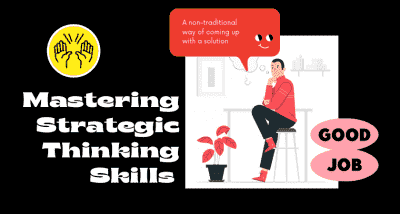Where Do You See Yourself in Five Years?
- Amruta Bhaskar
- May 21, 2021
- 0 Bemerkungen)
- 1921 Ansichten

Of all interview questions asked in an HR round, this one is very tricky – “Where do you see yourself five years from now?” – When interviewers bombard you with this question, their basic aim is to test your commitment to the job role. So do not stutter and try to express your thoughts confidently.
You may or may not have an exact picture of where you want to be in five years. Either way, there are a few guidelines you can follow to help you answer where you see yourself in five years in a way that communicates your enthusiasm for the job and impresses your interviewer.
What are your career plans? If you haven't thought much about the future, it's a good idea to consider it because you may be asked about it during job interviews. When you are interviewing for a new job, you may be asked a question such as, “Where do you see yourself in five years?” or "Where do you see yourself in ten years?"
It can be hard to articulate where you would like to be in your career next year, let alone five years (or longer) down the road. But even when you do know, it's important to be careful how you respond because you'll need to tailor your answer to the job for which you are interviewing.
The length of time employees stay with the same company varies based on age and industry. On average, 54% of people stay in the same role for at least 5 years. Hiring, onboarding and training a new employee is often seen as an investment and turnover is costly, so most employers seek candidates who plan on being at the company long-term. They typically want to hear that you see yourself in this role—or a relatively similar position—at the company for several years.
What the Interviewer Wants to Know
This popular interview question helps interviewers and hiring managers get a sense of how your career goals align with the company's goals. It also helps them gauge whether you’re likely to have a long tenure at their company or if you’ll probably leave after just a few months or a year on the job.
Employers want to know that your goals fit with the job they’re offering. For example, if you’re interviewing for an accounting associate role and eventually see yourself leading more complex accounting projects, which shows the interviewer you see yourself growing in this position in a way they can reasonably support you. Alternatively, if you’re interviewing for a marketing role and you want to be a UX designer in five years, you most likely won’t be considered a good fit for the job.
Employers may also use this question to assess whether you’ll be satisfied and engaged in the role over the next few years. If you want to reach a more advanced job title in five years than the employer can accommodate, they may determine that you are overqualified or would too quickly become bored in the position you’re interviewing for.
How to Answer "Where Do You See Yourself in Five Years?"
Questions about your future plans can be tricky to answer—you need to be honest in your response, but also keep it relevant to the job and industry. For example, don't share your five-year goal to publish a novel if you're interviewing for an accountant position.
Don't say this: My long-term goal is to leave the ad agency world and concentrate on my writing. I’m working on a novel right now that’s generated interest among a few agents. Hopefully, I’ll sign with someone soon.
However, it is important have a solid answer. Responding poorly or being vague in your response could make interviewers believe that you're not invested in your career, aren't a good fit for the company, or are covering something up.
Envision the experiences related to this position that you’d like to have on your resume in five years.
It can be a helpful practice to think about what an ideal resume might realistically look like for someone in this role five years from now. Think about the following categories and how they might look in the future:
- Are there incremental job titles you could grow into? For example, moving from an Engineer I to an Engineer II.
- Are there certain skills (technical or soft) that people in this field typically hone? A social media manager may want to gain experience creating videos or graphics.
- Are there any relevant or well known industry awards or certificates you could pursue? A sales representative may aim to win a “top sales person of the year” award.
- Are there specific achievements you could map out? For instance, becoming an expert and winning the opportunity to mentor junior team members.
You may not need to include all of these points in your answer during the interview. However, thinking about what your future resume might look like can help you shape your response.
Examples of the Best Answers
Review these options for giving the best answers for questions about the future, along with examples you can tailor to fit your own circumstances.
- Outline a Career Path
In order to prepare well for this question, research a reasonable career path that will flow from the position for which you are applying. How long does one ordinarily spend in that job? What are the next steps within five years?
Some employers will clearly outline pathways in the career section of their website. However, you may need to approach professionals in the field through alumni, family, friends, or professional associations to gain an accurate picture.
For example, if you’re a registered nurse applying for a clinical nursing position at a hospital, and your goal is to someday move into management, you should research the organization to see whether nurses typically work their way into nurse manager roles.
Start by looking for nurse manager openings on the company’s careers site, to confirm that the company is actively hiring. Then look at LinkedIn profiles of nurse managers currently working at the hospital. If this is a likely career path, your research should show that employees typically make that move.
Example:
I’m eager to continue developing my clinical skills as a member of this unit. I’ve also noticed that many nurse managers at City Hospital move from staff nurse to nurse manager, and that’s something that interests me as part of my five-year plan.
- Discuss Your Interest in This Job
It’s often advantageous to emphasize your interest in thoroughly mastering the initial position before moving on. If it seems like you are rushing past that first job, employers might question how motivated you are to carry out those duties.
After all, the hiring manager will probably want someone who’ll be happy and competent in that role for at least a year or two.
Integrating a clear rationale into your answer about how your interests and skills equip you to do the role can help to alleviate any concerns about how long you’ll want to stay in the job.
Example:
One of the things that drew me to this job is the opportunity to wear many hats. As the real estate agency’s administrative assistant, I know I’d have plenty of scope to continue building my customer service skills as well as a chance to put my web design abilities to use in refining the company website. I’m also excited to learn more about the business from the most highly regarded agents in the industry.
- When There is No Clear Career Path
Not all jobs are stepping stones to higher positions. For example, with positions such as counselling, sales, event planning, teaching, and computer programming, it’s perfectly appropriate to emphasize mastery of that job as your five-year goal.
Think about components of the job in which you can excel. For example, when interviewing for a sales job, you could say:
Example:
Within five years, I would like to be recognized as an expert in terms of product knowledge, have developed very close relationships with clients, have significantly expanded the client base in my region, and perhaps have been assigned some major national clients.














